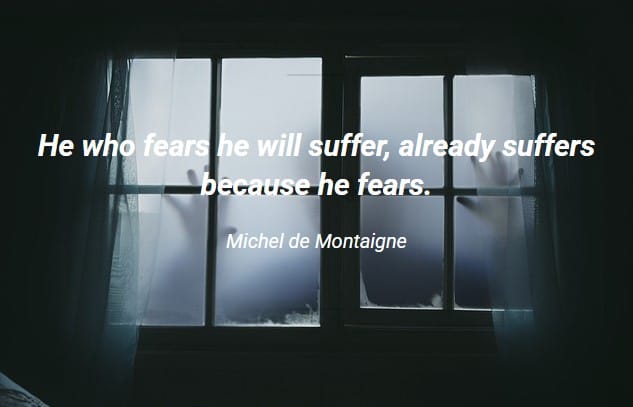
HRUM Quote of the Day: “He who fears he will suffer, already suffers because he fears” is attributed to Michel de Montaigne, a French philosopher and essayist from the 16th century. It speaks to the profound psychological and emotional impact that fear has on the human experience, especially when it comes to anticipating future suffering.
Deeper Meaning of HRUM Quote of the day:
1. Fear and Anticipation of Suffering:
The phrase suggests that much of human suffering is self-inflicted, not necessarily because of actual events, but because of the fear of what might happen. The person who constantly worries about pain, loss, or hardship may experience emotional distress in the present, even if the feared event has not yet occurred. This anticipatory anxiety creates suffering in the mind, which is often just as real, if not more intense, than the suffering that actually happens.
2. The Power of the Mind:
Montaigne is highlighting the immense power our thoughts have over our emotions and well-being. When we fear something, our mind starts to create a narrative of potential catastrophe. This narrative can trigger a cycle of worry, anxiety, and tension, all of which are forms of suffering that exist in the present moment. We can experience pain or distress because we are imagining it, not because it is happening.
3. Suffering Is Often a Mental State:
Montaigne’s quote also touches on the idea that much of suffering is subjective and rooted in perception. Suffering is not always a direct result of external events, but rather how we interpret or anticipate those events. The fear of suffering can cause a person to live in a state of perpetual distress, which may prevent them from fully experiencing life as it is.
4. Living in the Present:
At its core, this quote emphasizes the importance of living in the present moment. When we are preoccupied with the fear of future suffering, we lose our capacity to enjoy the present. Montaigne seems to suggest that by fearing suffering, we not only create suffering in our minds but also rob ourselves of peace in the here and now.
5. Philosophical and Stoic Themes:
The quote also resonates with the teachings of Stoicism, a school of philosophy that emphasizes the importance of controlling one’s reactions to external events. According to Stoicism, the only thing within our power is our own mind and perception. If we can change how we view suffering or adversity, we can reduce the pain it causes us. Montaigne, while not strictly a Stoic, seems to echo this idea that our mental state—how we respond to fear—can influence our experience of suffering.

Here’s a story inspired by Fear quote of the day “He who fears he will suffer, already suffers because he fears.”
Fear Story: “The Weight of Worry“
Elena had always been a cautious soul. She grew up in a small village nestled in the hills, where life was simple but full of uncertainty. Her parents had always taught her to be prepared for the worst. “Expect hardship, Elena,” her mother would say. “That way, when it comes, you’ll be ready for it.”
So, Elena lived her life bracing for trouble. When she was young, she feared the moment her parents might fall ill, or that she might lose her job, or that her friends would abandon her. As she grew older, her worries became more intricate: the looming uncertainty of the future, the fragility of relationships, and the ever-present fear that something terrible might happen when she least expected it.
One evening, as Elena sat in her small cottage by the fire, a letter arrived. It was from her childhood friend, Isabel, who had moved to the city years ago. Elena’s heart skipped as she opened it, hoping to hear some good news. But as she read the words, her face fell. Isabel had written that she was ill, seriously ill, and was unsure how much longer she could keep going.
For the next few days, Elena’s mind was consumed with fear. She thought of Isabel—her laughter, her warmth, their shared memories—and now, she feared she might never see her again. The thought of losing a friend she had known for so long was unbearable. The more she thought about Isabel’s illness, the more her own chest tightened. Her body ached with the weight of a suffering she hadn’t even experienced yet.
Elena couldn’t sleep. She paced the floor of her cottage late into the night, imagining the worst. What if Isabel’s illness took her life? What if Elena never had the chance to say goodbye? She couldn’t bear the thought.
The next day, Elena decided to visit Isabel. She would go to the city, comfort her friend, and do everything she could to ease the pain. As she packed her bag, however, something strange happened. Her mind began to race again, this time with a new set of fears. What if something happened to her on the journey? What if the roads were dangerous? What if she was too late to see Isabel?
Fear consumed her.
As she was about to leave, Elena paused in the doorway. She closed her eyes and took a deep breath. Then, without thinking, she stepped outside and started walking. But this time, instead of focusing on all the things that could go wrong, she tried to quiet the storm inside her mind. She focused on the rhythm of her feet, the beauty of the countryside, and the clear blue sky above her. She reminded herself that fear of the unknown would only hold her back.
The journey to the city took several days, and Elena’s thoughts remained restless. But as she finally approached Isabel’s house, something unexpected happened: the weight of her worry began to lift. Isabel was sitting outside, her face warm with a smile that lit up the air around her.
“Elena! You’ve come!” Isabel said, her voice full of surprise and happiness.
For a moment, Elena felt as if the ground had shifted beneath her. The fear that had plagued her for so long melted away in the presence of her friend, and all the worries she had carried with her seemed utterly distant. Isabel wasn’t gone. She wasn’t lost. She was sitting here, alive, laughing, and talking just as she had when they were children.
Elena sat beside her, listening to Isabel’s stories of life in the city, and as the hours passed, a strange thing happened. The fear she had carried in her heart, the fear that had made her tremble with anxiety, felt like it had never existed. In the end, she realized that all those sleepless nights spent imagining her friend’s death had not been preparation—they had been suffering in themselves. The very act of fearing had made her endure a pain she needn’t have known.
Before she left, Isabel gave Elena a gentle hug. “You’ve worried too much, my friend,” she said with a smile. “But I’m glad you’re here.”
As Elena walked back toward her cottage a few days later, her heart felt lighter. She had feared suffering, but the reality of the visit had shown her that the only suffering she had endured was the fear itself. Isabel was alive, and in that moment, Elena understood that true suffering comes not from the things that happen, but from the mind’s ability to create suffering before it even occurs.
Here is the End of Fear Quote of the Day Story and quote “He who fears he will suffer, already suffers because he fears”
In this story, Elena’s fears about her friend Isabel’s illness and the journey to see her cause her to experience suffering long before the feared event ever comes to pass. The lesson she learns is that fear itself can be a kind of suffering, and sometimes, the reality is far less painful than our anticipations.
To explore more on stories and dive into related ideas, be sure to check out the other posts where we cover all sort of stories related to quotes. Stay tuned for more…..
To explore more on quote topics, be sure to check out the other topics where we cover all categories of quotes. Stay tuned for more…..

